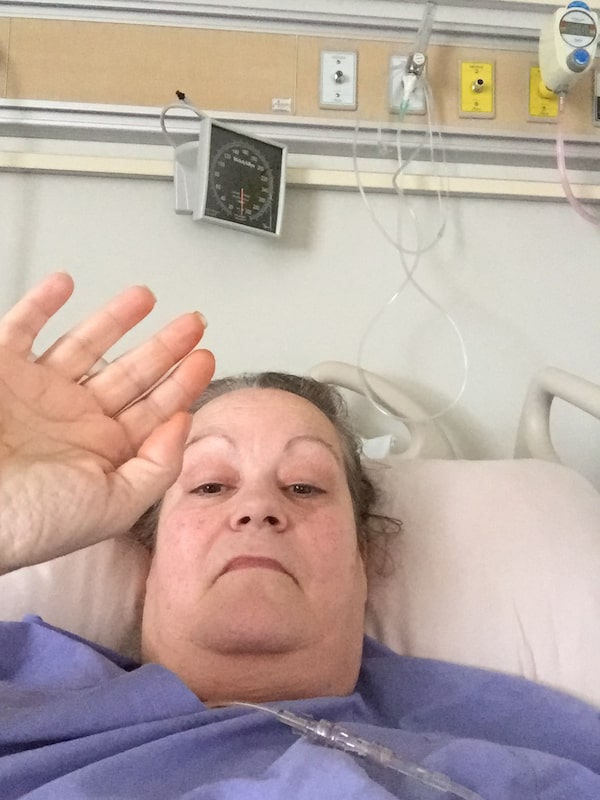
Don Russell and Andrea White met on a blind date and married in 1975.
Andrea Russell traced her decline to the night her husband of nearly 40 years was run down by a distracted driver.
The couple had been starting to talk that summer about how to mark their milestone anniversary. Instead he was killed coming home from work, leaving her widowed and grieving. The pain of her husband’s death, combined with severe health problems that intensified through the five years since the collision, left her so broken she opted for a medically assisted death last month.
“I have really good nurses and I’ve had them for a lot of years, and they just said that it destroys a person when something like this happens,” Ms. Russell, 64, said from her home in Essex, southwest of Toronto, a few days before she died. “The things that were going bad, it made it like 20 times worse.”
In interviews and correspondence over the final months of her life she told her story to The Globe and Mail, wanting the public to know the toll exacted by distracted driving, not only on the direct victims but on their family.

While Mr. Russell worked as a trucker, Ms. Russell worked as a hairdresser, among other jobs.
Don Russell was killed in 2015 by David Cassady, who was texting while speeding in Windsor, Ont. Mr. Cassady did not respond to requests, through his family, to comment for this story.
The death was one of a growing number in Canada blamed on distracted driving.
Statistics from the National Collision Database indicate that the number of crashes in Canada related to all forms of distraction has risen from around 55,000 in 1998 to nearly 85,000 in 2017, the last year of available data. According to Transport Canada, the proportion of fatal collisions involving distraction has also increased, rising from 14 per cent in 2004 to 23 per cent in 2017.
But statistics don’t reveal the full scale of the toll. Non-fatal collisions can leave people with life-altering injuries. After fatalities, children grow up without parents. Spouses lose their closest support.
The effects of bereavement can be profound. According to Mayo Clinic experts, some people who experience traumatic events suffer from “complicated grief,” a phenomenon not unique to distracted driving, which lasts longer than regular grief and can manifest physically. The effects may include high blood pressure and increased risk of serious diseases such as cancer.
Pamela Fuselli, president of the Canadian injury prevention group Parachute, says she’s seen the complex and debilitating effects of a distracted driving death.
An individual’s stress may be exacerbated by financial or legal problems, she explained, and they may struggle to care for themselves or their family. People are left to grieve a senseless death, one that comes without warning and may prevent them from saying goodbye. Some become mired in a corrosive anger.

Mr. Russell was also a motorcycle enthusiast, but Ms. Russell never worried about his safety on the bike.
Ms. Russell already suffered major medical problems – she’d undergone multiple surgeries and had heart damage from a serious attack, reduced kidney function, compromised stomach and bowels – but her health became worse after she was widowed. She cited a post-traumatic stress disorder diagnosis and two hernias, which she attributed to not having a husband to assist her. And the damage to her spirit was devastating.
Although her eldest son Ian Russell cited renal failure as the primary terminal danger she faced, he had no doubt that the trauma of losing her husband had helped propel his mother’s decline.
“The guy … took one man away, and mom, she died a slow death for four years,” said Mr. Russell, 47.
In a final interview with the Globe, Ms. Russell said she was ready to die: “I really feel at peace with what I’m doing.”
“I’m a pretty tough person, every surgery I’d pull my bootstraps up and just kept going. But when he killed Don that was it, it just broke me like I’d never been broke before,” she said. “He has indirectly killed me, more than you know.”
Don Russell and Andrea White met on a blind date and married in 1975. A trucker, he was away for long stretches through most of their marriage. Only in the latter years of his life did he get a trucking route that allowed him to come home every night. She worked as a hairdresser, among other jobs, and took care of their sons, Ian and Scott.

Mr. Cassady's short time in prison angered Ms. Russell, who became a recluse in the years to follow.
Mr. Russell was also a motorcycle enthusiast, though his wife says she never worried about his safety on the bike. It was driving truck that made her concerned, she said. But he was on his Honda motorcycle, coming home from work late on the night of July 28, 2015, when Mr. Cassady rapidly overtook him.
According to court documents, the 22-year-old had been driving far above the speed limit on a highway near Windsor airport, at the wheel of a borrowed Infiniti sedan. He told police he’d consumed two alcoholic drinks in the 1½ to two hours before the incident and had looked at his phone.
“The accused chose that moment, with the speedometer hovering around 190 [kilometres per hour], and with other vehicles present on the highway, to take his eyes and his mind off the road and compose a text message,” Ontario Superior Court Justice Thomas Heeney wrote in his sentencing decision. “At that point, the missile was effectively out of anyone’s control.”
Although Mr. Cassady told police he didn’t see Mr. Russell, in the final second before impact the Infiniti’s computer recorded an application of the brakes and a slight twist of the wheel. Mr. Russell was struck at approximately 166 kilometres an hour and died at the scene.
“That’s not an accident,” his widow said. “You don’t accidentally look down and start texting, you know what I mean? That’s a choice you make.”

'That little spark that keeps your life going, she’s just losing it,' her son Ian said the week she died.
Mr. Cassady failed a roadside sobriety test, though the follow-up tests taken later at the police station were inconclusive as to whether he had been over the limit at the time of impact. The Crown dropped an impaired driving charge and he pleaded guilty to criminal negligence causing death.
While sentencing, Justice Heeney called it an aggravating factor that texting while driving is “a growing and pernicious problem on our roads,” one that “continues apparently unabated” in spite of enforcement and awareness campaigns. He said he wanted to send “a clear and powerful message” that distracted driving is unacceptable and sentenced Mr. Cassady to 3½ years.
At a 2017 parole hearing, according to coverage in the Windsor Star, Mr. Cassady acknowledged having had at least four drinks before driving and said he’d habitually texted at the wheel since getting his licence. The board denied full parole but released him to a halfway house. He’d served less than a year.
The brevity of his prison stint angered Ms. Russell. Bereft, she became a recluse in the years to follow. Her fury ate away at her and her health problems snowballed. Her soul wilted.
“Physically, mom was nose-diving,” her son Ian recalled.
“That little spark that keeps your life going, she’s just losing it,” he said the week she died. “All of us are trying to do whatever we can, but how do you, how do you give someone the spark, like how do you do that? I don’t know.”
In her final days, Ms. Russell did find a measure of solace, pleased to be following her husband into death.
“I just feel like it’s time,” she said, her voice breaking. “I know I’ll have peace. Wherever he is, I’m coming, you know what I mean?”

Our Morning Update and Evening Update newsletters are written by Globe editors, giving you a concise summary of the day’s most important headlines. Sign up today.
 Oliver Moore
Oliver Moore